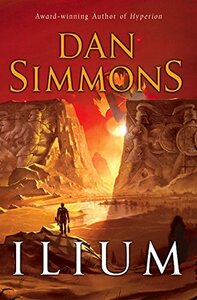You need to sign in or sign up before continuing.
Take a photo of a barcode or cover
dnf @ 3%. dan simmons needs to be kept away from women and i don't care enough about the iliad to slog through this no matter how well the storylines come together at the end. (funny words magic man syndrome also Horrible)
Okay, and then I came across Lord of Light by Roger Zelazny (better late than never). This 1967 story has a very similar setup to the Ilium stories. Ilium takes many more words, has a lot more of decorative stuff and is more tech-heavy.
Nevertheless, in retrospect Ilium feels like a story that is 'heavily inspired' by Lord of Light.
Meh.
Adjusted from 4 to 2 stars.
Original review:
A good read, though not matching up to the brilliant Hyperion series.
Nevertheless, in retrospect Ilium feels like a story that is 'heavily inspired' by Lord of Light.
Meh.
Adjusted from 4 to 2 stars.
Original review:
A good read, though not matching up to the brilliant Hyperion series.
Nowhere else in a bookstore will you find a book with William Shakespeare, Little Green Men, Marcel Proust, quantum teleportation, Homer, Artificial Intelligence, robots, hybrid humans, time/space travel and parallel universes mentioned within the SAME PARAGRAPH. Dan Simmons has a way of combining seemingly unrelated characters, stories and themes in a way that is plausible and exciting. Here, we have three distinct plots moving at the same time, converging only towards the end of the book. Yet, never for once does Simmons lets the reader's mind wander. Each character of every story is important and endlessly fascinating. Even the non-human characters ooze charm and intrigue, and I cannot lay on more praises for the relationship between the two moravecs in the story.
And because Ilium is a combination of a myriad genres, there is a little something for everybody. Fans of hard science fiction will love the science fiction elements; fans of literary fiction will love the frequent references to Proust, Homer, Shakespeare and the Bard's most iconic characters (Setebos, Caliban, Prosperos, Sycorax and Ariel all make appearances in the book); fans of Greek tragedy will love the retelling of the Trojan War in vivid details. Hell, there is even a mind-bending section towards the end that involves the Trojans, the Greeks, Zeus, a thermonuclear bomb and a robot army from outer space -- all happening at the SAME TIME. If it was by any other author, this story would've failed upon take-off. Yet, it's Simmons, and I am familiar with what he can do with genre-bending (The Terror is one of my favourites of 2013).
Absolutely stunning piece of work. Not recommended, however, for someone who's in for an easy read, or if you are not into hard science fiction. However, if you have an open mind and would like to challenge yourself to fiction on another level, give this a shot.
And because Ilium is a combination of a myriad genres, there is a little something for everybody. Fans of hard science fiction will love the science fiction elements; fans of literary fiction will love the frequent references to Proust, Homer, Shakespeare and the Bard's most iconic characters (Setebos, Caliban, Prosperos, Sycorax and Ariel all make appearances in the book); fans of Greek tragedy will love the retelling of the Trojan War in vivid details. Hell, there is even a mind-bending section towards the end that involves the Trojans, the Greeks, Zeus, a thermonuclear bomb and a robot army from outer space -- all happening at the SAME TIME. If it was by any other author, this story would've failed upon take-off. Yet, it's Simmons, and I am familiar with what he can do with genre-bending (The Terror is one of my favourites of 2013).
Absolutely stunning piece of work. Not recommended, however, for someone who's in for an easy read, or if you are not into hard science fiction. However, if you have an open mind and would like to challenge yourself to fiction on another level, give this a shot.
It combines 2 of my favorite things, Sci-Fi and Greek Mythology, but it just didn't click with me. I found this to be a tedious read with little payoff by its conclusion.
adventurous
funny
medium-paced
Plot or Character Driven:
Plot
Strong character development:
Complicated
Loveable characters:
Yes
Diverse cast of characters:
No
Flaws of characters a main focus:
No
adventurous
dark
mysterious
slow-paced
Plot or Character Driven:
Plot
Strong character development:
Yes
Loveable characters:
No
Diverse cast of characters:
N/A
Flaws of characters a main focus:
Yes
Puto increíble. Es bonito cómo en ocasiones la narración emula a la de La Ilíada. El autor consigue ir hilando las diferentes historias de una forma muy sutil e inteligente.
My one good thing to say about this book is that it got better toward the end. Considering how terribly it started (see: page 6) that’s not saying very much. We started off with a grown man sexualizing a child for all the gods’ sakes - or should I say all the post-humans’ sakes?
Because therein lies another problem: D.S. never gives any concrete answers to who or why, and just barely squeezes in answers to when and where everything fits together. My friend described this book as D.S. trying to shove in every literary reference possible just so he can prove how smart he is, and I agree with that!
He also shoehorns in all of the fancy scientific concepts he can think of and here we see my personal pet peeve: D.S. can’t write hard sci-fi but he sure did try. He can’t even do basic math most of the time (a problem first encountered on page 6 and most notably seen when he says one-child-per-woman maintains a stable population size). He clearly did research about some things, but he pulled others out of the sky. That’s not how hard sci-fi gets to work. @D.S. if you’re going to try to explain things with fancy technobabble you need to be right. You can’t gloss over some things and hope that a surfeit of description in other places makes up for it. (See also: “D.S. does not know reptiles vs amphibians”, “mass and weight are not the same”, and “every time he said something was made of ‘bucky carbon’ my ears started bleeding”).
The three sections of this monstrosity were not interwoven. They alternated but did not relate until the last possible moment, and generally only one was readable at any given point. The moravec chapters were generally best because at least their main problem was “far too much Shakespeare and Proust” (there is a page taken straight from Proust inserted in this book) whereas the problems with the Ilium/Trojan War and Daeman/post-human storylines include: misogyny, homophobia, anti-Semitism, Islamophobia, sexualization of anything with a pulse, outright rape, and white saviors.
Oh, and the writing is shitty.
Because therein lies another problem: D.S. never gives any concrete answers to who or why, and just barely squeezes in answers to when and where everything fits together. My friend described this book as D.S. trying to shove in every literary reference possible just so he can prove how smart he is, and I agree with that!
He also shoehorns in all of the fancy scientific concepts he can think of and here we see my personal pet peeve: D.S. can’t write hard sci-fi but he sure did try. He can’t even do basic math most of the time (a problem first encountered on page 6 and most notably seen when he says one-child-per-woman maintains a stable population size). He clearly did research about some things, but he pulled others out of the sky. That’s not how hard sci-fi gets to work. @D.S. if you’re going to try to explain things with fancy technobabble you need to be right. You can’t gloss over some things and hope that a surfeit of description in other places makes up for it. (See also: “D.S. does not know reptiles vs amphibians”, “mass and weight are not the same”, and “every time he said something was made of ‘bucky carbon’ my ears started bleeding”).
The three sections of this monstrosity were not interwoven. They alternated but did not relate until the last possible moment, and generally only one was readable at any given point. The moravec chapters were generally best because at least their main problem was “far too much Shakespeare and Proust” (there is a page taken straight from Proust inserted in this book) whereas the problems with the Ilium/Trojan War and Daeman/post-human storylines include: misogyny, homophobia, anti-Semitism, Islamophobia, sexualization of anything with a pulse, outright rape, and white saviors.
Oh, and the writing is shitty.
Still not entirely sure what I just read, but what a 800+page journey! Lots of delicious morsels and references for Iliad and Odyssey lovers...a very well-researched book.
I've read so many books about the Trojan War that it was so refreshing to read about Achilles and Hector joining forces. I did not care so much for the Earth storyline, nor the very 90's sex scenes and/or descriptions of women (yes, the book was written in 2003 but still).
Here's to the next 900+ pages of Olympos! Gotta find out what happens...
I've read so many books about the Trojan War that it was so refreshing to read about Achilles and Hector joining forces. I did not care so much for the Earth storyline, nor the very 90's sex scenes and/or descriptions of women (yes, the book was written in 2003 but still).
Here's to the next 900+ pages of Olympos! Gotta find out what happens...







